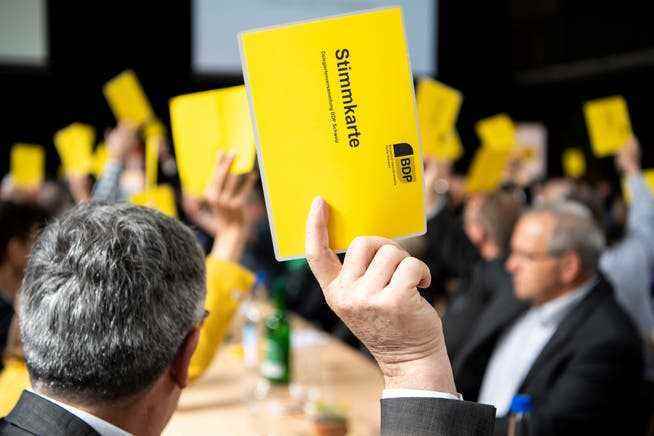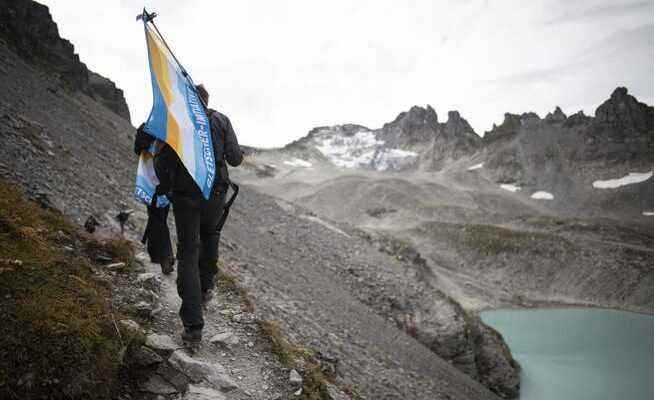The trade association is again provoking the climate: it calls the glacier initiators “extremists” – and refuses to commit to the “net zero” goal.
The glacier initiative demands that fossils be banned by 2050 – is there a compromise?
Ruedi Noser is the Zurich FDP Council of States and much more. A trained machine mechanic who was the boss of 500 people, for example. So, as an entrepreneur, Noser was “the good choice for the trade” for the Zurich Trade Association in the 2019 elections. For the Swiss trade association, Ruedi Noser is now an “extremist”.
The background is the glacier initiative, where Ruedi Noser sits on the committee. The initiative wants to ban fossil combustibles and fuels by 2050, which is too radical for the majority in Bern. That is why the National Council is discussing a compromise next week: a framework law for the climate. It is intended to persuade the Glacier Initiators to retreat.
The Environment Commission of the National Council has approved the framework law from the SP up to and including the FDP, only the SVP swerved. The party is now receiving support from the trade association, which rejects any compromise on the initiative – remarkably sharp-tongued. The association’s deputy director Henrique Schneider says: “Parliament lets itself be put under pressure by a small group of extremists.”
attack in their own ranks
The accusation hits many people from the bourgeois ranks. Various politicians from Mitte, FDP and BDP have signed the glacier initiative. Even today’s top electricity supervisor in Switzerland, Elcom President Werner Luginbühl, had put his signature under the initiative text as a member of the BDP Council of States.
In the committee, the commoners take the attack calmly. A thick skin is needed in politics “very fundamentally”, says the FDP Councilor of States Ruedi Noser. “That’s why I personally leave such statements cold.”

The glacier initiative has many bourgeois supporters: the delegates of the BDP (today in the middle) approved the initiative.
The Grisons center politician Stefan Engler, he is also a member of the Council of States, does not respond to the accusation of extremism – but criticizes the uncompromising attitude. In order to use the opportunities of the transformation, companies need planning and investment security, says Engler.
The climate framework law would offer that. It would define how much emissions must fall over what period of time. It would enshrine net-zero Switzerland in law by 2050.
The trade association refuses this commitment to climate neutrality: “We reject climate targets for 2050,” says Henrique Schneider.
Although the Federal Council has already committed itself to the net zero target, the trade association finds: “Such a decision would have to be made by Parliament. And then in front of the people.”
As with the CO2-Law
This threatens a déjà vu in climate policy. The last attempt at reform failed in the summer of 2021 due to a referendum by the SVP. The trade association was also critical at the time. Another referendum seems possible. The SVP National Councilor Christian Imark had already said when the compromise proposal became known: “As of today, it is realistic that there will be a referendum.”
Economiesuisse takes a different stance. The business umbrella organization supports the climate framework law. Together with the planned principle that all companies in Switzerland should report “net zero” in 2050. Alexander Keberle, head of the climate department, says: “For us, the question is not whether we can achieve climate neutrality, but how.”
Such voices also exist at the grassroots level of the industry. The association has been rumbling about the topic of climate for a long time.
For certain members, such as the gas station operators, the hard line of the association’s leadership comes in handy. However, there are also timber builders in the trade association who advertise their houses as a contribution to climate protection. The electrical trade that offers intelligent controls to save electricity. Or the building technicians who install photovoltaics or heat pumps.
Christoph Schaer is director of Suissetec, the association of building technicians. If the conversion is to come, the industry needs a reliable framework for planning and investment, he says. “A certainty that the journey is going in this direction.”
Schaer has previously publicly criticized the climate policy of the trade association. Conservative forces dominated in the association, he says. “And maybe ‘trade association’ isn’t the right name anymore. The association’s energy and climate policy is primarily geared towards the interests of large corporations.”
Oil in industry
For example on the oil importers. Their organization Avenergy resigned from Economiesuisse two years ago and joined the trade association. Almost at the same time, the car importers changed the association because they were bothered by the fact that Economiesuisse had a CO2– Assisted levy on petrol and diesel.
The levy was part of the revised CO2law that crashed at the ballot box in the summer of 2021. Six months later, Federal Councilor Simonetta Sommaruga presented a new, much more modest reform. The trade association is betting on this card when it comes to the climate. The new CO2law has “absolute priority,” says Henrique Schneider. It must not be “infected” by the glacier initiative. Otherwise it will not be able to win a majority.
